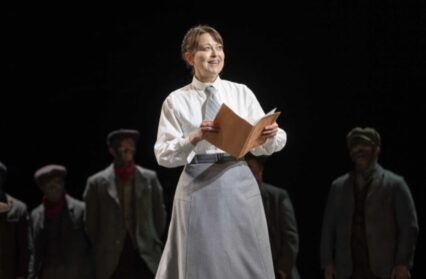Reflecting on Gary Owen’s recent play, Romeo and Julie, at the Sherman Theatre, David Cottis explores the connection between this latest adaptation of Romeo and Juliet and Emlyn Williams’ The Corn is Green.
(It should be noted that the following piece contains spoilers for the ending of Romeo and Julie, so if you haven’t seen or read it, you might want to leave reading this till afterwards. It also gives away the ending of another play, but you probably know that one.)
Gary Owen’s Romeo and Julie, a Sherman/UK National Theatre co-production which has just finished its Cardiff run, is a work that bears an obvious resemblance to earlier classic play, itself a story of youthful impetuosity, inter-generational conflict, and the dangers that go with sexual desire. I’m referring, as you’ve probably guessed, to Emlyn Williams’ The Corn is Green (1938).
Despite the title, Romeo and Julie doesn’t really have much to do with Shakespeare, beyond the fact that it’s the story of two young lovers from (slightly) different backgrounds. The parallels with Williams’ play, to those who know it, are much more striking; Julie, like The Corn is Green’s Morgan Evans, is a working-class character, trapped in an unsatisfactory environment, who aims to escape it by going to an ancient university (Oxford for him, Cambridge for her). Both are nearly frustrated in their ambitions by a pregnancy; Evans impregnates a local girl who wants to marry him, while Julie runs out of condoms with her boyfriend, Romeo (pronounced like the car, not the Shakespearean character, and usually abbreviated to ‘Romy’). In the end, these problems are solved, and the characters head off to the banks of the Isis and Cam, following, in each case, the real-life trajectory of their authors.
Now, I don’t know if Gary Own was consciously thinking of The Corn is Green when he wrote his play, although it’s fairly certain that he knows it, given that it’s a Welsh classic, and was on at the Lyttelton theatre last year (where I reviewed it). The play has something of the quality of a national myth, especially for the kind of Welsh writer who, as Williams said of himself, wants Wales as a place to go back to, not as somewhere to remain.
The differences between the two are as telling as the similarities – where Morgan Evans is spotted and encouraged by a teacher, the inspirational Miss Moffat (a sentimentalised version of Williams’ own experience), Julie is self-taught, rather improbably doing four science A-levels despite describing her physics teacher as ‘useless’. The Welsh language, which in Williams’ play is the mark of the working-class mining community has, in twenty-first century Splott, become the signifier of aspiration – Romeo identifies Julie’s Welsh medium education as a marker of their social difference.
One other thing that has changed, although not as much as you might expect, is in the two plays’ sexual politics. Morgan Evans’ future is saved when Miss Moffat agrees to bring up the child as her own. It might be fairer to tax Williams with contrivance rather than sexism here – a willingness to settle for conventional, rather copped-out, final acts was a recurring feature of his work – but the end effect is the same; the happy ending is achieved by a woman agreeing to sacrifice her life for a man.
By the time we get to Romeo and Julie, such extreme measures aren’t necessary – Julie gets an abortion. However, before we get to that point, there’s a long period where she considers keeping the baby, giving up her Cambridge place. This course of action is first suggested by Romy, in a speech that sits rather oddly for a character who, although uneducated (and, in the published text, illiterate) is shown as very intelligent, and who, as a single father himself, knows how difficult it is:
‘I’m not gonna tell you what to do.
But I’m begging you:
Don’t go away with what you’ve always thought
And tell yourself you’ve got to go on the same
Because life fucking ambushes you again and again
And what you think is gonna ruin you –
Well, it does, it wrecks you fair play
But you climb out of the ruins and you’re someone else.
And maybe someone new.’
(Romeo and Julie, p. 67. All layout as in the original.)
Like Williams, Owen may be simply taking the path of theatrical convenience – after all, if Julie had an abortion immediately, the play wouldn’t have a second act – but it’s still striking that for her to give up her long wished-for future should be presented, at least for a while, as a desirable outcome.
If the sexual politics have moved on less than expected, the social politics have gone backwards. Both Evans and Julie have speeches about their experiences at university interviews; while he talks about getting in conversation with an undergraduate, and realising the possibilities within himself, she recalls getting blanked by a snobby posh girl, who refuses to talk to her after realising she wasn’t privately educated – social mobility becomes less about advancement, more about getting back at those who are already secure in their privileges. Towards the end of The Corn is Green, Miss Moffat says that she pushed Morgan Evans in the hope of what he might become, maybe ‘a great statesman’ (given the date, there is an inevitable hint of Lloyd George) – the underlying belief is that the individual can benefit the wider group, and that’s why he should be encouraged. Julie talks about becoming a great physicist, but the play holds out less hope that things can get better – in this world, the best thing an individual can do for a working-class community is to leave it, and inspire others to do the same. The play gives Romy the last word:
JULIE: What do I do? What do I do?
ROMY: You go.
And be brilliant.
For all of us.
(Romeo and Julie, p. 113)











